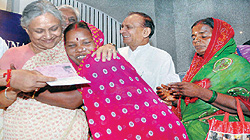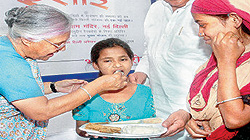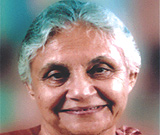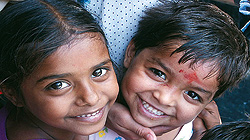 The Delhi Government’s Mission Convergence (MC) is one of the most innovative initiatives that any Government anywhere in the world can adopt. It is a well thought out initiative that is the brainchild of Delhi’s Chief Minister Sheila Dikshit and it seeks to identify the state’s most vulnerable citizens, and find ways to reach them and guarantee them their basic rights to food, education, health care and social security. The Delhi Government’s Mission Convergence (MC) is one of the most innovative initiatives that any Government anywhere in the world can adopt. It is a well thought out initiative that is the brainchild of Delhi’s Chief Minister Sheila Dikshit and it seeks to identify the state’s most vulnerable citizens, and find ways to reach them and guarantee them their basic rights to food, education, health care and social security.
The reasoning behind MC is very clear—even though the Delhi Government tries its best to help the under-classes through various welfare measures, the benefits from these trickle down very slowly, caught as these measures are in a maze of complex bureaucratic procedures, and lack of information and transparency. Says Chief Minister Dikshit, “The challenges lie in strengthening delivery mechanisms, bringing in institutional and administrative reforms, and enabling our Government to reach out to the poorest of the poor.”
But bringing about changes is easier said than done. The under-classes are everywhere in Delhi, their dwelling spaces barely qualifying to be called homes. Each day swelling hopefuls arrive in Delhi, searching for a livelihood, and add to the capital’s numbers that are really poor. They toil at construction sites, lug loads, draw rickshaws, recycle waste, vend on streets, serve households, work factories. They are essential for the city to keep ticking, but at the end of the day they’ve hardly earned enough to pay for two square meals. They remain on the fringes, ever vulnerable to a range of health and socio-economic problems. A detailed survey structure for covering about 30 lakh people in the first phase has been finalized.
RESPONSIVE AND RESPONSIBLE
Key MC initiatives include being more responsive and responsible. The Delhi Government feels that is time to be proactive, time to reach out with a range of welfare schemes to the under-classes. Unless this is done, no scheme will be successful. The intent is to entitle these citizens to utilize the services that have been developed for them. If unused, the relevance of such services is negligible. Mission Convergence is about Entitlement of the Vulnerable.
|
The challenges lie in strengthening delivery mechanisms, bringing in institutional and
administrative reforms, and enabling our Government to reach out to the poorest of the poor
—Delhi Chief Minister Sheila Dikshit |

|
FACTOR VULNERABILITY
MC extends its invitation to the vulnerable and endeavours to go to their doors in order to bring them to the windows that are being opened for them. A door to door survey is planned to identify the vulnerable using proxy indicators of income. For this, a new set of criteria needs to be developed for defining poverty in Delhi, criteria that would be more verifiable, more measurable and be common to all departments of the Delhi Government.
 The houseless / precariously housed, older persons, single women, disabled people, single unprotected children and those with debilitating illnesses, construction labour, rag-pickers, porters, casual daily labour, street vendors, cycle-rickshaw drivers, casual domestic workers living in notified or non-notified slums or resettlement colonies, irrespective of caste or creed constitute the vulnerable segment in society. The houseless / precariously housed, older persons, single women, disabled people, single unprotected children and those with debilitating illnesses, construction labour, rag-pickers, porters, casual daily labour, street vendors, cycle-rickshaw drivers, casual domestic workers living in notified or non-notified slums or resettlement colonies, irrespective of caste or creed constitute the vulnerable segment in society.
ONE WINDOW FOR ALL NEEDS
Delhi Government acknowledges that in a bureaucratic system people need to run from pillar to post to get their work done. There are procedural hurdles, programmes are duplicated by departments, and convenience is a casualty. MC believes that services need to be provided in a single window. This means involving the departments of Health, Education, Social Welfare, Women and Child Development, Food and Civil Supplies, Labour, Urban Development (including local bodies), Information Technology, Schedule Caste and Schedule Tribe, OBC, Minority and Backward Class Welfare.
MC encompasses financial assistance / social assistance programmes (pensions for old age, disabled and widows), food security schemes (PDS, ICDS, Mid-day Meals), Public Health Care Schemes (Mamta, Janani Suraksha Yojana, Swasthaya Bima Yojana), Educaton, Protection and Rehabilitation of Children, Women Empowerment Programmes (GRC, SHG) and Urban Poverty Alleviation livelihood programmes for the poor (SJSRY).
SUVIDHA CARD
A Suvidha Card for benefiting the vulnerable classes is being introduced. It will pave the way for a uniform database and turn into a privilege, and not just a facility for the targeted section it intends to reach. The card will have biometric features, and reduce scope for corruption. The comprehensive computerized database would be shared among all concerned departments, and thereby eliminate chances of ambiguity and duplication. The scheme would help in designing plans for the targeted groups and in effective coordination and appropriate monitoring of the schemes.
BHAGIDARI
No scheme can ever succeed without the participation of local people in planning, implementation, monitoring and evaluation. MC is not just an attempt to increase the participation of the local communities, but also to empower them as equal partners. It is an endeavour to reach out to the poor in inaccessible areas or areas that have remained deprived thus far. We firmly believe that this can definitely be achieved through participatory cooperation at all levels.
MC seeks to work closely with Non-Government Organizations (NGOs) and other community-based organizations (CBOs). Resident Welfare Associations too would be involved in the programme.
BUILDING BLOCKS
A State Convergence Forum has been constituted under the chairmanship of the chief secretary of the Delhi Government. A Programme Management Unit (PMU) has been set in motion with a Mission Director as the CEO. Each deputy commissioner has been designated as district-in-charge to guide the Mission in preparing district level micro-plans.
|